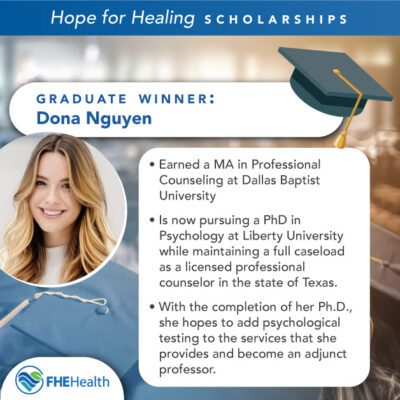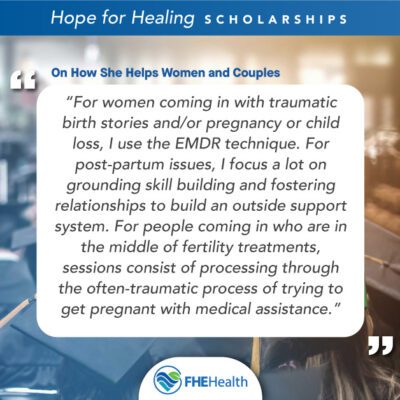
Each year FHE Health awards two outstanding individuals, one an undergraduate and one a graduate student, with a $5000 scholarship to help further their education in the field of addiction, mental/behavioral health and/or psychiatry. In this second of two blogs spotlighting this year’s winners, you’ll meet Dona Nguyen, the graduate recipient of the 2024 Hope for Healing Scholarship. Catch her moving story below….
When Dona Nguyen shared her story in application for the 2024 Hope for Healing Scholarship, she began it with this statement: “In 1996, my family and I embarked on a journey that would forever shape the course of our lives. Fleeing the war-ridden country of Bosnia, we arrived in the United States.”
The Refugee Experience: What It Was Like
 Nguyen later described more of that experience in an interview with FHE Health. She “was five years old, and the war was affecting everyone, not just Bosnian Muslims.” Nguyen, who is ethnically Serbian and Croatian, said “many people around us were getting arrested or killed during this time.”
Nguyen later described more of that experience in an interview with FHE Health. She “was five years old, and the war was affecting everyone, not just Bosnian Muslims.” Nguyen, who is ethnically Serbian and Croatian, said “many people around us were getting arrested or killed during this time.”
Before she fled to the U.S. and settled in Texas, Nguyen lived in Doboj, Bosnia, and Zagreb, Croatia.
“I don’t remember much of my early years,” Nguyen said. “I do remember where we lived and that I enjoyed my preschool. I have gone back to visit in years since and do wish that I could have experienced more of life there.”
The Challenges of a New Culture and Lessons from the Hardships
Nguyen has more memories of growing up in Texas and the challenges of trying to assimilate as a refugee kid from a very different place and culture.
The landscape of her new home was “vastly different from the war-torn mountains and hills of former Yugoslavia,” she wrote in her essay. The hardest thing, though, about having to adapt to a new culture and make new friends was the language barrier.
“I didn’t speak English and was put in ESL classes where the rest of the students spoke Spanish,” Nguyen said.
Isolation and a Sense of Difference: Life as a “Third Culture Kid”
Experiences like these contributed to “a sense of isolation” and “a profound sense of difference,” not just within Nguyen’s community but within her own family as well, she wrote in her essay:
The struggle to assimilate and fit in fueled a profound sense of difference, not only from my new community but also from my own family of origin. The generational and cultural gaps strained my relationship with my parents, leaving me feeling like an outsider in my own home.
Nguyen described more of this experience in our interview:
There is a term called “third culture kid” that explains my experience. I wasn’t American culturally, and even though I am white, I related more to friends who were from different ethnicities. Their cultures and how they were parented reflected more of my home life.
I also didn’t feel like I fit in with my family as I was sometimes “too American.” There were a lot of things my family didn’t know about as they were not brought up here, and I had to learn how to handle many things without guidance, ranging from youth sports to college applications.
Lessons from the Hardships and Challenges
The hardships and challenges of cultural assimilation as a refugee gave Nguyen “a deep understanding” of the plight of those “on the margins of society.” She also discovered “the importance of embracing diversity and celebrating the richness that comes from cultural differences.”
The Life-Changing Impact of Therapy
Nguyen, a first-generation college student, was an undergraduate at Baylor University when she first sought therapy. The decision changed her life, and she described this transformation in her essay. Therapy, and with it, “the transformative power of self-love and acceptance,” became “an integral part” of her journey and her educational and vocational formation— “allowing me to unravel the layers of my identity and find peace with the dualities of my cultural heritage” and “learning to love myself for who I am.”
Becoming a Trauma and Maternal Health Therapist
 Nguyen realized she wanted to become a therapist shortly after finishing her undergraduate studies at Baylor, with a BA in Communication Sciences and Disorders.
Nguyen realized she wanted to become a therapist shortly after finishing her undergraduate studies at Baylor, with a BA in Communication Sciences and Disorders.
At the time, “I was working as a speech therapy assistant and really connected with the parents of the children I worked with,” she said.
Nguyen went on to earn a MA in Professional Counseling at Dallas Baptist University and find her specialization in trauma and maternal health:
As I was pursuing hours for my post graduate internship, I noticed a lack of counselors focused on maternal mental health issues in my area (of Dallas-Fort Worth). During this same time, I had fertility issues myself and had two pregnancies in three years that were difficult. This gave me great empathy for mothers (and fathers!) struggling in this area of life.
What are some ways that Nguyen helps mothers and couples who come to her for counseling?
“Depending on their presenting problem, I modify counseling for what they are needing,” Nguyen said. “For women coming in with traumatic birth stories and/or pregnancy or child loss, I use the EMDR technique. For post-partum issues, I focus a lot on grounding skill building and fostering relationships to build an outside support system. For people coming in who are in the middle of fertility treatments, sessions consist of processing through the often-traumatic process of trying to get pregnant with medical assistance.”
Pursuing a Doctoral Degree and Beyond
 Today, Nguyen is pursuing a PhD in Psychology at Liberty University while maintaining a full caseload as a licensed professional counselor in the state of Texas—and, showing up as a wife and mother to two young girls.
Today, Nguyen is pursuing a PhD in Psychology at Liberty University while maintaining a full caseload as a licensed professional counselor in the state of Texas—and, showing up as a wife and mother to two young girls.
With the completion of her Ph.D., she hopes to add psychological testing to the services that she provides and become an adjunct professor.
What does she want her greatest contribution to be in the field of behavioral health?
“As most of my clients are parents of young children, I hope that helping them regulate and have better mental health will influence the next generation as well,” Nguyen said.
A Final Message of Hope and Healing
Hope and healing are central themes of Nguyen’s story, both past and present. Could she offer any words of encouragement, we wondered, to those who might be struggling to believe life will get better?
“Take it day by day, or even breath by breath. You can and you will survive this, even if it doesn’t feel like it in the moment,” Nguyen said. “You are capable of great amounts of resiliency, and all it takes is one breath after another.”






